Making movies. Enjoying movies. Remembering movies.
Related Articles:
"Herbie: Fully Loaded" Premeire Photo Gallery
|
By
William Kallay
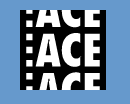
A day before the Oscar ceremonies, the American Cinema Editors (ACE) hosted a gathering at the Egyptian Theatre in Hollywood, California. The purpose of this was to give the public a look at the job of a film editor. Thelma Schoonmaker, ACE (“The Aviator”), Jim Miller, ACE & Paul Rubell, ACE (“Collateral”), Matt Chesse (“Finding Neverland”), Joel Cox, ACE (“Million Dollar Baby”), and Paul Hirsch, ACE (“Ray”) were on-hand to talk about their craft.
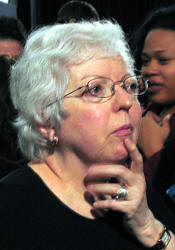 |
|
Thelma Schoonmaker, ACE |
The seminar, sponsored in part by the American Cinematheque, was held first
thing in the morning on February 26. Despite a half-hour delay in
getting the show started, the seminar began before a full house. A number of
editors and film students gathered here to see some of the top editors in
the business.
Moderator Alan Heim, ACE (“All That Jazz,” 1979) discussed a number of
editing-related topics with the panelists. Clips from each of this year's
Oscar-nominated films were played on the giant Egyptian screen.
It was emphasized that the job of an editor isn’t merely to put pieces of a
film together, or simply cut dialogue scenes. Film editing is an art form
which can either make or break a scene in a film. The addition of just a
single frame, for instance, can change the emotion of a scene.
Each editor has been editing for a number of years. Some of the most
interesting stories came from Joel Cox, who has been working for Oscar
winner, Clint Eastwood, since 1976 on “The Enforcer.” He has been working in
the film industry since he played a baby in “Random Harvest” (1942), then
eventually got into editing. He also told the audience that his working
relationship with Eastwood has been very cordial over the years, with
Eastwood having re-cut only one scene that Cox has put together in 30 years.
Cox won an Oscar for "Unforgiven" (1992).
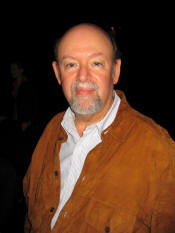 |
|
Paul Hirsch, ACE |
Thelma Schoonmaker, winner of an Oscar for her outstanding work on "Raging
Bull" (1980), talked about working on everything from “Woodstock” (1970) to
“Gangs Of New York” (2002). She commented that she and director Martin
Scorsese worked very closely on each of his films, and that she appreciates
the fact that he uses less takes these days.
There was some discussion about the use of modern digital editing machines
compared to film. Schoonmaker looked to the audience and said that most of
them probably have never touched a piece of film while editing. Cox says he
misses, to an extent, the sense of running film through a Moviola (now
considered an old-fashioned editing machine). He enjoys the ease of editing
on an AVID, with its non-linear editing ability to pick and choose cuts at a
moment's notice, but the aesthetic of celluloid was missed. Overall, each
editor seemed to like the convenience of digital editing.
Clips from each nominated film were screened to show off the editing skills
of all. Schoonmaker’s clip was from when Katherine Hepburn (Cate Blanchett)
takes Howard Hughes (Leonardo DiCaprio) to visit her family. The dining room
scene shows the erratic clatter of Hepburn’s family and Hughes’
uncomfortable feeling of being among them.
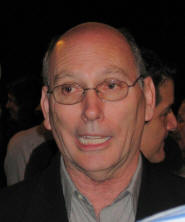 |
|
Joel Cox, ACE |
For "Collateral," Miller and Rubell had two scenes shown: a scene where
Vincent (Tom Cruise), Max (Jamie Foxx) and Barry Shabaka Henley (Daniel)
have a calm, then tense conversation, and the nightclub shootout scene. It
was evident through watching these clips that the editors carefully built
suspense in the scenes to keep the audience on edge.
Matt Chesse’s "Finding Neverland" clip was mostly from a dinner scene, in
which Sir James Mathew Barrie (Johnny Depp) has dinner with his wife (Radha
Mitchell) and Sylvia Llewelyn Davies (Kate Winslet) and her family. Then the
clip cuts to an outdoor scene with Depp teaching Davies’ boys how to fly a
kite. His film editing was a contrast in that it was quiet editing; you
don’t see the cuts of the film, but feel them emotionally on a human level.
Joel Cox’s scene was of a major turning point in “Million Dollar Baby,”
which I will not discuss here, as many of you may have not seen the film.
But his scene was dynamic in how it cuts from intense action to raw emotion.
Finally, Paul Hirsch’s scene from “Ray” was comprised of quick cutting style
and a quick succession of scenes that begin with a love affair Ray Charles
(Jamie Foxx) has with studio singer, Margie Hendricks (Regina King). The
scenes build with intensity and sexual overtones all the way into a live
club appearance by Charles. Hirsch shared an Oscar with Marcia Lucas and
Richard Chew for their work on "Star Wars" (1977).
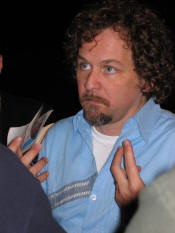 |
|
Matt Chesse |
All of the scenes shown at the Egyptian were great examples to see how each
editor has fashioned a sequence of cuts into storytelling. Miller and Rubell
told the audience, for instance, that the jazz club scene wasn’t very
exciting to watch in dailies. Through editing and selecting the correct
cuts, they shaped an uneasy scene in which the audience suspects something
is about to go down. And as in all of these cases, it was demonstrated that
an editor is very important to a film’s storytelling technique.
After the seminar was over, a good number of audience members had a chance
to meet the editors. Many film students asked the question: “How do I get
into the film industry?” To paraphrase Schoonmaker, do anything. Be a
director’s driver. Get someone’s coffee. Get your foot in the door. That’s
how she did it, and so did some of the other editors.
Congratulations to Thelma Schoonmaker for her Oscar for “The Aviator,” and
to all of this year’s Oscar nominees for their excellent work in editing.
Photo Credits
William Kallay (© 2005 From Script To DVD)
